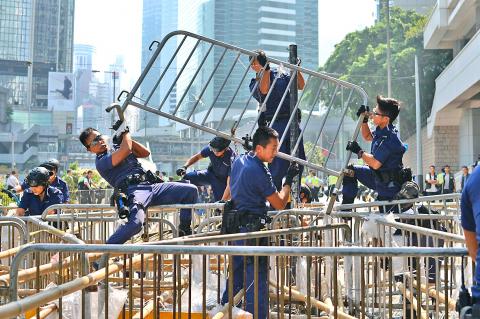Hong Kong police yesterday vowed to tear down more street barricades manned by pro-democracy protesters, hours after hundreds of officers armed with chainsaws and boltcutters partially cleared two major roads occupied for two weeks.
In a concerted effort to reduce the territory held by protesters, police tore down barricades in the bustling shopping district of Causeway Bay and on the edge of the main protest encampment in Admiralty, near the city government’s headquarters. They also vowed to target protester cordons in Mongkok, a working-class district known for its triad gangs, where violence has previously broken out.
Huge crowds have intermittently rallied against China’s insistence that it will vet candidates standing for election as the semi-autonomous city’s next leader in 2017 — a move protesters have labeled “fake democracy.”

Photo: AFP
While the activists have been praised for their civility and organizational skills, they have also brought widespread disruption to an already densely populated city. Angry and sometimes violent scuffles have broken out between demonstrators and government loyalists, sparking accusations the authorities are using hired thugs to sow trouble.
Police had been keeping a low profile at the three main protest sites after a decision to fire tear gas at peaceful demonstrators on Sept. 28 caused outrage and encouraged tens of thousands to take to the streets.
However, in the past two days, officers have begun probing protester defences in raids aimed at opening some roads to traffic, while allowing the bulk of demonstrators to stay in place. About 150 police dismantled metal barricades at the Causeway Bay site before dawn yesterday, freeing up traffic in one direction, but leaving the protest camp there largely intact.
Hours later, another contingent of officers tackled barricades at the main Admiralty site, using chainsaws to slice through bamboo poles and freeing up one of the multi-lane highways in the district.
At both sites protesters put up little resistance, sticking to their promise of non-violence.
Some protesters were seen sobbing as police went to work dismantling the barricades.
“We are only residents and students,” one tearful young woman shouted at police. “We will leave, as we are unable to fight you, but we will not give up.”
Police insisted they would soon turn their attention to Mongkok.
A similar clearance operation on Monday at the edges of the Admiralty protest camp prompted activists there to swiftly regroup.
They laid down cement foundations and built up bamboo pole barricades blocking both lanes of a highway, using everything from steel chains to plastic cable ties and sticky tape to strengthen them — even enlisting sympathetic construction workers for help.
However, police yesterday cleared them in less than an hour.

Tropical Storm Gaemi strengthened into a typhoon at 2pm yesterday, and could make landfall in Yilan County tomorrow, the Central Weather Administration (CWA) said yesterday. The agency was scheduled to issue a sea warning at 11:30pm yesterday, and could issue a land warning later today. Gaemi was moving north-northwest at 4kph, carrying maximum sustained winds near its center of up to 118.8kph and gusts of 154.8kph. The circumference is forecast to reach eastern Taiwan tomorrow morning, with the center making landfall in Yilan County later that night before departing from the north coast, CWA weather forecaster Kuan Shin-ping (官欣平) said yesterday. Uncertainty remains and

SEA WARNING LIKELY: The storm, named Gaemi, could become a moderate typhoon on Wednesday or Thursday, with the Taipei City Government preparing for flooding A tropical depression east of the Philippines developed into a tropical storm named Gaemi at 2pm yesterday, and was moving toward eastern Taiwan, the Central Weather Administration (CWA) said. Gaemi could begin to affect Taiwan proper on Tuesday, lasting until Friday, and could develop into a moderate typhoon on Wednesday or Thursday, it said. A sea warning for Gaemi could be issued as early as Tuesday morning, it added. Gaemi, the third tropical storm in the Pacific Ocean this typhoon season, is projected to begin moving northwest today, and be closest to Taiwan on Wednesday or Thursday, the agency said. Today, there would likely

DISRUPTIONS: The high-speed rail is to operate as normal, while several airlines either canceled flights or announced early departures or late arrivals Schools and offices in 15 cities and counties are to be closed today due to Typhoon Gaemi, local governments announced last night. The 15 are: Taipei, New Taipei City, Taoyuan, Tainan, Keelung, Hsinchu and Kaohsiung, as well as Yilan, Hualien, Hsinchu, Miaoli, Chiayi, Pingtung, Penghu and Lienchiang counties. People should brace for torrential rainfall brought by the storm, with its center forecast to make landfall on the east coast between tonight and tomorrow morning, the Central Weather Administration (CWA) said. The agency issued a sea warning for the typhoon at 11:30pm on Monday, followed by a land warning at 11:30am yesterday. As of

CASUALTY: A 70-year-old woman was killed by a falling tree in Kaohsiung as the premier warned all government agencies to remain on high alert for the next 24 hours Schools and offices nationwide are to be closed for a second day today as Typhoon Gaemi crosses over the nation, bringing torrential rain and whipping winds. Gaemi was forecast to make landfall late last night. From Tuesday night, its outer band brought substantial rainfall and strong winds to the nation. As of 6:15pm last night, the typhoon’s center was 20km southeast of Hualien County, Central Weather Administration (CWA) data showed. It was moving at 19kph and had a radius of 250km. As of 3pm yesterday, one woman had died, while 58 people were injured, the Central Emergency Operation Center said. The 70-year-old